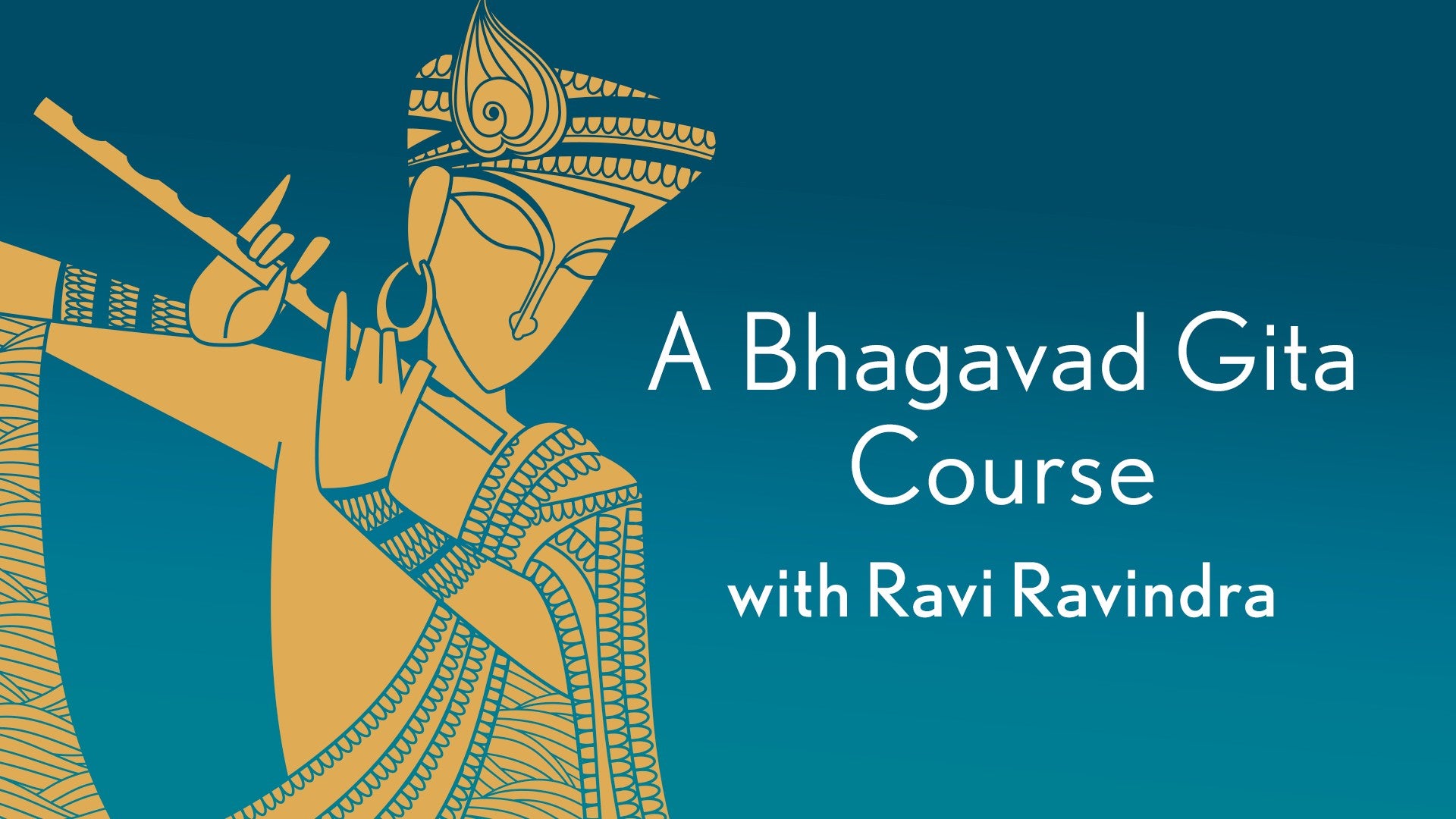Description
About This Video
Transcript
Read Full Transcript
Meditation
Again, let us bring our attention more and more inside. And a very quick reminder from yesterday that the whole space is filled with conscious and subtle energies and also an occasional reminder about the vastness of the universe in which we exist. To find the right alignment, again, these are not the sorts of things which one can prove in any scientific manner, but for some of us, this call to have a vertical posture, and if my eyes are open, I should be able to look horizontally, is really placing oneself at the crossing of the vertical and the horizontal dimensions, possibly related with the two great commandments in the Bible, to relate with divinity and to take care of one's fellow human beings. So to search for that posture and remaining in a state of mind which does not know everything, it is willing to be surprised. Now we bring our attention to our breathing, a simple reminder that I did not create this breathing apparatus.I did not start breathing myself. And all ancient teachings say in one form or another that it is the breath of divinity that is keeping me alive. Just a quick reminder, this is from the book of Genesis. God created human beings from the earth. And He breathed His own breath into them to make them alive.
Not to imagine that we understand all the delicacy of this or that we can figure this out, but a good reminder that as long as I am alive, it's actually the breath of God in me. So to return to that reminder naturally raises a question. Why am I alive for a few decades? And am I basically this body that is alive that is destined to die or am I this breath of God which is keeping me alive? Not knowing, but wondering, if I approach inquiries like this with a sense of wonder, it does not lead to fear or to tension.
Our heart is able to hear some subtle whispers, but I remain intentionally in contact with the fact of breathing taking place. It can be assisted if I just become aware of the movement of my abdomen up and down corresponding to breathing in and breathing out. It also assists the very mobile mind to stay here somewhat connected with the body which is much more stable. It's quite natural for my ordinary mind to wander away thinking of this or that. Whenever I can become aware of it, I return to this very great mystery.
Do I breathe or am I being breathed? If I keep returning to this mystery while remaining in contact with the fact of breathing, any serious existential questions naturally arise. As I can hardly say that I created this breathing apparatus, then is my breathing a personal project? Why have these subtle forces or energies or God taken the initiative to make me alive? try to hear the whispers especially if I can keep my ordinary mind more and more quiet.
I try to hear the whispers especially if I can keep my ordinary mind more and more quiet. Only when the mind is a little quieter, these subtler feelings can be more alive. Only very important scientist Pascal made this remark that heart has reasons that reason does not know. We approach this by what is my deepest longing behind my usual concerns and fears and desires. I try to hear the whispers especially if I can keep my ordinary mind more and more quiet.
Thank you. We take three more breaths, wondering but not concluding. Why do I breathe or am I being breathed? Thank you, we'll stop now.
Talk
We'll start today from where really more or less we ended yesterday, namely the crisis of conscience that Arjuna had and so we therefore return to the very remark in the Bhagavad Gita with which we ended yesterday.This is the seventh shloka in the second chapter. My very being is afflicted with the flaw of pity and weakness of spirit. My mind is bewildered about dharma. I ask you, tell me decisively which is better. I'm your pupil for I have taken refuge in you, teach me.
So out of this, the remark that I just want to stay with, actually even one word, Arjuna said my mind is bewildered about dharma. Dharma is one of those, I would say five or six words, not only in the Bhagavad Gita, but really in fact if anybody has any serious interest in anything coming from India, this will be a few words which are essential to try to understand because any one word translated into English just doesn't suffice. So let me just stay with the word dharma for a few moments. First of all, just to express the importance of this word, at least in the Bhagavad Gita, dharma is the very first word in the Bhagavad Gita. Dharma Kretre, Kuru Kretre, Samaveda, Ayuttsava, Mamaka, Pandavas, Shaiva, Kim Kurovata, Sanjaya.
A blind king is asking his companion who temporarily has been given the grace of clairvoyance and clairaudience. So he can see at a distance, he can hear at a distance. This blind king cannot go to the battle, so he's asking his companion that in the field of dharma, in the field of action, where my sons and my brother's sons were gathered to fight, what did they do? So it's the whole field of dharma that is the issue. So it's the very first word and again always keeping in mind, as I earlier said yesterday, all of this also has to be understood internally.
Most of us, including myself, I am a kingdom of which I am completely blind. What is taking place inside me is not so clear. But occasionally one has the possibility of hearing something deeper or one is touched by something deeper, then one wonders, different kinds of questions arise. So it's easier to speak externally, there is a blind king who is asking this, but keep in mind again and again that what we are really speaking about is something quite internal. So also dharma is clearly emphasized very much.
In fact the very last remark that Krishna makes in the Bhagavad Gita, he asks Arjuna, have you listened to our dialogue about dharma carefully? So as far as he's concerned, this is the whole dialogue about dharma. So in a way let me therefore emphasize this importance of this word and right away to say that it is extremely difficult to give one English word translation of this. For example, it means duty, responsibility, obligation, it also means law, for example a judge in India would be called a dharma murti, keeper of dharma, also means order, it also means support, for example dharma are also referring to the various laws that are supporting the universe. And it can also mean teaching, what is in English we would call buddhism, in Sanskrit it is called vodadharma, meaning dharma of the Buddha, teaching of the Buddha.
So you see how many meanings this word has, therefore almost impossible to convey by one single English word what it means. I recommend a phrase, responsibility for maintaining order, that is dharma. And one of the reasons I'm suggesting that phrase, because then right away it indicates different levels of dharma, for example I'm responsible for maintaining order in myself, in the family, in the society, on the planet and of course if I were a large being like the Buddha or Christ then I'm responsible for maintaining order in the cosmos but we stay only up to the level of the planet that is sufficient for us, partly I say that because Krishna actually says that he's responsible for maintaining order in the cosmos. But for us, right away then we see, since we have dharma at many levels, that the action that corresponds to the right dharma at one level may conflict with the action required at another level. Very simple example, in fact there are several examples of this kind in the last dozen years even within USA.
So we take the example of a CEO of a company, we are naturally wishing to increase the shareholders value, makes sense. But then he or she discovers that what the company is producing is harmful for the planet. And assuming, and this is actually true, you can find on the internet some people literally had a crisis and then they either wish to add different chemicals which increases the price or their shareholders fire them or something or the other happens. But this is an example of a crisis resulting from conflict of the right action at two different levels of dharma for the same person. In fact I would generally like to suggest that as long as we are unclear what I should be doing, we are having a conflict of dharma.
In fact we sometimes elaborate this as a great idea, I have a choice, I could do X or Y. Krishnamurti made this very interesting remark, as long as you have a choice you are not free. What does it mean to have a choice? Which means I don't have a clear perception. The Christ had no choice, the Buddha had no choice.
They know one thing that needs to be done, whether they like it or they don't like it. In fact it is absolutely the classical remark of Christ in the Garden of Gethsemane, eve of his crucifixion, if it is possible let this cup pass me by, yet not my will but thine be done. He has no choice, he'd rather not have, who wants to be crucified? So in a way to have a choice really is an indication of a lack of clarity, which in a way tells us the one action that I need to undertake. In fact every serious teaching, Yoga Sutra is a good example of this, among the very first things one needs to be free of is like and dislike, in the Bhagavad Gita also very strong emphasis on this.
However, essentially then the question arises, dharma really refers to what is the right action in any given situation, at whatever level of occupation I have. So what is the right action? And in a summary way one may say that Krishna's response is that no action can be right until the actor is right. Then also the implication that if the actor is right, whatever action he undertakes is right, which is every serious teaching can be very dangerous, partly because teachings as I will soon speak about more in detail are all requiring a very radical transformation of our whole being, but people can just, I believe this, one is not transformed and so this is the right action, whatever action I do is the right action. You see that this is, every serious teaching has that danger in it.
This is what creates all the fanatics in religious warfares. However, coming back to the main point that Krishna is making, that what is necessary is for Arjuna to become the right actor and will speak in a few moments about what is the right actor. But before that, I need to make some general remarks. As far as I understand, if there is one common teaching of all the great sages and all the scriptures, it is this, as long as I remain the way I am, I cannot come to the truth or to God or to the real or to the absolute, whatever label appeals to me. That a radical transformation of my whole being is required in order for me to come to the truth.
This is the one common lesson, as far as I know, of all the teachings. This is easier said than done, because that requires obviously a very fundamental transformation. But it may be useful for me to give a few examples here, but before I go there, let me just mention that Krishna therefore teaches yoga because the intention of yoga is to make him the right actor. Yoga is a science of transformation. I have to keep reminding all of my yoga friends that it is not just standing on one's head.
That's what yoga is about. Yoga is a science par excellence for inner transformation. And that transformation is expressed in varieties of ways. For example, in the Christian context, a new birth, you have to be born again, is the remark of Christ. Some of you know that.
That Nicodemus comes to Christ in the middle of the night. He's a member of the Jewish Sanhedrin. The Sanhedrin was divided in its opinion. Sanhedrin means council, whether Christ was a radical or a great sage. Ultimately, it was by the majority opinion that he was condemned to death.
But not everybody in the Sanhedrin believed this. People often don't realize this, that even after his death, his own disciples are running away. It's only two people who took care of his body. They were both members of the Jewish Sanhedrin. And Nicodemus was one of them.
And the other one was just forgetting my name for the moment. But the two of them take care of his body. So in any case, Nicodemus comes in the middle of the night so that he doesn't get farmed out, I guess. Maybe I shouldn't be saying that too publicly, but I know at least one cardinal in the Vatican who went to the Dalai Lama for some spiritual advice, obviously, in the middle of the night so that he doesn't get caught, otherwise it doesn't work out. So his very first question is, how may I enter the kingdom of heaven?
And what is the Christ's remark? Unless you're born again, people often forget, stop there, let me complete the sentence. Unless you're born again, born from above, born of the spirit, you cannot enter the kingdom of heaven. And Nicodemus is not an ordinary guy. Literally the phrase means ruler of men, by the way, in Greek.
He's a member of the Sanhedrin. You don't ordinarily become a member. But even he clearly doesn't understand this. He takes it literally, what he says, how can an old man like me reenter the womb of his mother? This is what he understands, being born again.
Whereas it is a completely radical transformation that is at issue here. Here I have actually quoted here. This is from John's third chapter. And I will read the part that Christ said, in truth, in very truth, I tell you no one can see the kingdom of God unless he's born again. Flesh begets flesh, spirit begets spirit.
Do not be surprised that I tell you that you must all be begotten from above. And this whole idea is several times repeated in the Gospels, slightly different language. For example, in the Gospel of Matthew, I may have it here. Yes, I do, actually. This is what Christ said.
He who would follow me must leave self behind. In John's Gospel, the man who loves his self loses it, while the man who hates his self in this world reserves it to life eternal. Sometimes it is expressed very strongly, even another remark of Christ, unless you die to the old man, you cannot be born as the new man. So very strong suggestion in every scripture. You really don't read that part.
They just read something how they can get to heaven somehow. The radical transformation of the whole of myself before one can come to anything to do with God or truth are real. And in a summary way, one could say that this is basically the idea is not freedom for myself, but freedom from myself. What is myself? In general, we need to consider this because why have all this teaching in which Krishna says until the actor is right?
The implication is that in general, the actors are not right. Otherwise, why undertake all this transformation business? So we will specifically speak in the language of the Bhagavad Gita. How is the right actor described? And here, let me just take a few moments, first of all, to say that fulfilling dharma, Krishna says, requires the discipline of yoga.
But then another word, which is very important, is then Krishna says, but the yoga cannot be accomplished without yajja. That is pronounced two different ways, especially in North India, it's pronounced as yajja. It's Y-A-J-N with a little tilde on top, A. Now, that word, yajja, is almost always translated as sacrifice, which is certainly not wrong. But unfortunately, the contemporary English usage of the word sacrifice is not adequate to convey this. So I need to take a few moments to spell this out a little bit more.
Very strong idea, which in a way I've already really said, that there are many levels of reality, these are not only outside us, but they're also inside us. We also have many levels of reality in us. For example, a remark of St. Paul, very interesting remark, actually, eyes of the flesh, see the things of the flesh, eyes of the spirit, the things of the spirit. In fact, another way of saying what all spiritual practice is about is to open our eyes of the spirit so we can see things of the spirit. Otherwise, however extended our microscopes and telescopes may be, they remain eyes of the flesh.
But eyes of the spirit are also potentially in us, or to speak it more in the Indian style, that even ultimately if Brahma is also within me, so that means various levels are also within me. So the suggestion that those levels, externally speaking, in the biblical tradition, they get called different levels of the angels. I already mentioned nine orders of angels. In Sanskrit expression is deva. So there are many devas outside, but also inside.
It's always important to keep emphasizing this, especially again in the Western world, there has become a tendency very strongly, as if God or heaven, hell, is all outside somehow, very strong tendency. In India, very much the emphasis that it is also outside, of course. I mean, I don't have an exclusive possession of this, but it's also inside. In fact, the real searches, this is the reason for emphasis on meditation, and you can look at, you can see how a simple idea influences the whole work of art, or art tradition. In India, you will hardly ever see the portrait of a sage except in a posture of meditation.
For example, look at the images of the Buddha, but in the whole biblical tradition, it will be unusual to find a portrait of a sage in the position of meditation. It will be always in a position of prayer, usually looking upward, which at a low level, I mean, otherwise prayer and meditation have many things in common, but at a low level, it becomes, oh, God is above, or God is inside. That's the low level understanding of everything that proceeds, so that becomes the cultural occupation. So one needs to be very careful that the whole tradition of art is influenced by one simple idea, and then we are constantly influenced by our cultural background, whether we like it or not. This is inevitable, requires an enormous amount of true learning to be a little free of that.
When we say to be free of myself, it's a very large project, let me assure you. Okay, so then the suggestion of what yajja is, to be sure it is sacrificed in the sense that I have to be willing to sacrifice my usual level, but until there is also a participation from a deeper level in me, or another way of saying, unless there is a deva or an angel, is also assisting, nothing will be accomplished. So the word yajja definitely has this implication and is very strongly emphasized its importance in the Bhagavad Gita. Here is the remark of Krishna in the Bhagavad Gita from the fourth chapter. This world is not for one who does not practice yajja.
How then any other world, O best of the Kurus, that's another name for Arjuna. So he asks Arjuna, how can you think of any other world? Even this world cannot be achieved without yajja. So yajja requires sacrificing really what I know, or at least my attachment to what I know, more and more freedom from that, and participation of a subtler level. And then the word yajja is very highly regarded, for example in the Rig Veda, it is called is the very navel of the cosmos around which everything turns, sacrificed.
This is of course fundamental to Christianity. After all, why would God send his only begotten son? Hardly for a bowl of cherries here, he was being sacrificed. So one needs to understand that sacrifice is absolutely at the heart of cosmological order, and very highly emphasized. Then this suggestion, really any scientist will tell you this, several scientists can have exactly the same data which actually happened with the general theory of relativity, and only one person comes up with the theory.
Why? There is a tendency to say, oh he was lucky, it was his destination, or it was his destiny, or something or the other. But even very great scientists, let me actually mention this here, this is an example from Einstein, he was often asked, what is the source of creativity? Is it hard work, or is it chance? They didn't use the word grace, they used the word chance.
And this is his response, ultimately creativity is a matter of chance, but chance seems to favor the prepared. So here I have a remark here from one of the very great sages in India, Shweta Ashwatar. He said all human realization is a combination of two things, in Sanskrit the words are tapas prabhav and devaprasad, meaning effect of human effort, and the benediction of the devas. Both are needed, any poet can tell you this, any writer can tell you this, any scientist can tell you this, often it is the case they work very hard and nothing is coming out, so they go for a walk or go to sleep or have a nice big cup of whiskey or something, then sometimes not everybody, not for every time, occasionally a great insight comes, from where? Without their work it will not happen, but without the intervention of a different level, whether we call it angel or devas or God, it won't happen.
So it's important, I make this as a general remark, without God it will not take place, without human beings it cannot, sorry, without God it cannot take place, without human beings it will not take place, so both are required. How does one undertake yoga, whole practice of yoga, with the understanding of involving deeper and deeper levels within myself and also submitting to the levels outside? So prayer, meditation, these are often very intimately connected with each other, except as I said at ordinary level they got just fixed one way or the other. So coming back to basically the suggestion that yoga needs to be undertaken because that is the science of transformation, but to undertake yajja. Now here maybe I will take a few moments to also remind you that that was actually true with the word sacrifice even in English.
Etymologically the root of the word sacrifice, there are two Latin words, sakare, fakare, to make sacred, that's the root of that word, and that nothing can actually be sacred unless we connect it with a higher or a deeper level. So that is actually implied, but otherwise usual usage of that has gradually forgotten this, otherwise traditionally you can even read it in some of the older gospels, of course non-canonical right away, why they were recommending so-called human sacrifice, not sacrificing other human beings, but sacrificing oneself to make it sacred, to connect with something sacred, it's much easier to sacrifice others. And so all of these words have to be taken seriously, but one also needs to understand that it's an inevitable tendency in every culture downhill mass kind of levels at which can more money be made or can something be sold. So we now have actually, you may not believe me, evangelical ministers asking for more than 100 million dollars to buy an aeroplane so that they can go from, you can go on the internet to check this, that's what religion is about. In my personal judgment organized religions have done more harm to spiritual search than any other institution, they just want you to become believers not searchers.
So please don't even believe anything I'm saying, no seriously to question to become a searcher, but coming back nevertheless to the main point I'm trying to make. In the Rig Veda the very first word is Agni, literally means fire. The reason I'm saying that, because every yajja now in India has become externalized as I said is necessary for transmission of culture. So every sacrament in India, whether it's marriage or school going for the first day or name giving or whatever, all of them take place in the presence of fire. Some of you may have seen Indian weddings, maybe on a movie or something like this.
The couple will go around a fire seven times. And Agni is actually, it's the very first word in the Rig Veda and is said to be the first of the devas, not the highest deva. All the rishis, rishi really literally means a sage or a seer, for example we say Raman Maharishi meaning great sage. So there are nearly a thousand rishis in the Rig Veda, 50 of them are rishikas, women rishis. But their first hymn, some of them have only one hymn, some have written five or six hymns, but their first hymn is always to Agni.
So he's the first deva and then he's invited to become the priest, there is no human priest mentioned in the Rig Veda. Literally the word in Sanskrit is Purohit for priest, that means one who works for the benefit of the others, that's the literal meaning of the word, Purohit. And so then Agni, as I said, can assist going to higher devas or ultimately to Brahma and it becomes externalized and only occasionally we have great sage, Aurobindo was probably the first one in the 20th century to really elaborate this in detail, that what Agni is, the fire in the belly, is the aspiration, the inspiration, that's the first deva, fire of effort. In fact the word Tapas in Sanskrit, which is one of the requirements of Kriya Yoga in the second chapter of the Yoga Sutras, the very first sutra, Tapas literally means temperature. Sometimes you have come expressions like this, there is even a book called Fire in the Belly, there is another book called Fire in the Mind and there is another book called Fire in the equation, so obviously these are not setting them on fire.
So unless one has this internal fire, no yajja can be fulfilled basically, that's what one is actually saying. So then the other devas can be approached. So the suggestion that in order to fulfill Dharma, Arjuna needs to undertake the practice or discipline of yoga, but that the yoga cannot actually be fulfilled without yajja, which now for simplicity I am simply saying yajja here would mean first of all sacrificing to what I am now attached to, to be willing to have a radical transformation of myself, and secondly intervention or a help from a level deeper than my usual level within myself or a level higher than the usual level outside myself, because of this requirement of freedom from myself. It is a very interesting remark actually of Krishnamurti, as long as I am, love is not. Sounds very simple but try to, as long as I am, love is not.
So now question then, what is the right actor? The very strong idea, actually in every culture you can find it, that of two natures, often for example St. Paul refers to them as spiritual nature and carnal nature. One is as it were coming from higher level from God, another one is coming from the lower level, from the animal side. The basic idea is, I can give you many references for this from every teaching, but I will largely stay with the Bhagavad Gita. Basic idea is that the universe is manifested at many levels, but that each level is wishing to, as it were, return home, return to God, return to Brahma.
This is actually an expression of St. Augustine, that our real home is the home to come. And therefore, in order for, let us say, a particle of divinity at one level to evolve, it needs to undertake some action. And this is why it needs a body to undertake some action. Therefore, what is important to understand, and now I use just the ordinary English word, is the soul that takes on a body, not the body that takes on the soul. It needs to be very clear about this.
The initiative is from the spiritual side, not from the material side. Why does it take on a body? Because it wishes to evolve, therefore it needs to undertake certain kind of action. We have a very classical expression of that in a man called Ishwar Krishna, who is the author of Sankhikarika, Sankhya and Yoga are two disciplines philosophically very close to each other. Just like Patanjali is the author of Yoga Sutras, similarly Sankhikarika is this.
This is what he said, spirit without body is lame. Body without the spirit is blind. So in order to undertake the right kind of action that will help the evolution of the spirit, an instrument is needed. So the body, including the mind by the way, I don't need to keep saying that. For example, when it is said in the Gospel that the word became flesh, doesn't mean just became a hunk of meat, obviously it became the whole living being.
Similarly here, I'm using the word body, but it includes the mind, the ordinary mind. So that is intended to be the instrument for undertaking the right action. But the instrument seems to take on its own life, gets very much occupied with itself. And therefore the suggestion is that in general, almost every human being is actually being driven by the bodily needs and desires. Whether it is shelter, whether it is sleep or whether it is food or it is sex, that is what is driving every human being.
And then the ordinary mind in Sanskrit, by the way, the word is manas, that Krishna actually twice in the Bhagavad Gita includes manas among the senses. It is being practically completely driven by the body. And that is, if you like, the wrong action. Now the right action, which is why the main yoga that Krishna teaches in the Bhagavad Gita, I will come back to this next time in detail, is buddhi yoga, yoga of awareness. Because whatever I become aware of changes in its quality and in its relationship with me.
A very simple example, we are breathing all the time, but we are not aware of our breathing. Right now you can try. If you become aware of your breathing, the quality of your breathing will change. You don't need to impose this mentally by saying, oh, I should breathe deeply or anything like this. In fact, that is the greatest pranayama according to Patanjali, just awareness of breathing.
And then, the quality of the breathing will change and it will have a different effect on the organism. That's the main yoga Krishna teaches. I have hardly ever heard any yoga teacher, whether it is Saiyanga or Deshakacha or any of these characters, who don't seem to even know this. Bhagavad Gita three times Krishna explicitly says this in the second chapter, then in the middle of the Gita, which is the 10th chapter, then the last chapter, which is the 18th chapter, that those who are serious yogis to them I teach with the yoga. Why the hell don't we take it seriously?
Three times Krishna says this. But we just do one asana or the other, and it's all money-making schemes that goes on. Yoga is a very radical science of transformation. I have to keep reminding people. In any case, so Krishna then basically says if the buddhi or awareness is developed, then it can be aware of what is above itself, namely, buddhi is still personal.
My buddhi is different from your buddhi, but it can be aware of what is transpersonal, what is above itself, which is the spiritual element that has come into the body. Now here, let me read this to you from the Bhagavad Gita. This is the third chapter. The senses are great, they say, but manas is above the senses, and buddhi is above manas, and above buddhi is the embodied one. He doesn't even give it a name, but later on he says it's a particle of myself that has taken on the body.
Thus having known that which is higher than buddhi, sustaining the self by the self, slay the enemy of Arjuna, which has the form of desire and which is difficult to conquer. So that's the real enemy, that is the issue here, desire. And they also add the word fear, fear and desire. And that's the real battle. So the suggestion then is, the reason why the ordinary manas needs to be or ordinary mind needs to be quietened, then it is possible to connect with the higher mind, subtler mind, or as Krishnamurti used to say, intelligence beyond thought.
Here is another quotation from the Bhagavad Gita, this is the sixth chapter, when the mind is wholly under control and stands stilled in the self, when no desirable thing causes the heart to crave it, then it is said, one is in yoga. So remember next time you practice yoga. Just as in a windless place, the flame of a lamp does not flicker, so is the mind of a yogi who practices union with the self. Here is a reminder again and again that the ordinary mind is not the real knower. But it can become a good instrument of knowledge, just as microscope is not the real knower, but we can have a good microscope or a bad microscope.
So a good mind, according to Patanjali in the Yoga Sutras, is like a clear diamond, wherever it is placed, it reflects the color of the object without introducing its own color. This is extremely important thing to understand, the whole of spiritual practice everywhere is interested in what we would really call completely objective knowledge, that the subject is really out of the way. It's almost like knowing without the knower, seeing without the seer, pure perception contributed by the object what I am looking at, not contributed by my mind. So this is extremely important thing to keep emphasizing it, and that ultimately, of course, the aim of yoga, as I have already said, is to become Brahma, which is possible only when my usual self is out of the way. I am free of it.
To be free of it doesn't mean to be against it. It's an extremely important thing to realize, because my ordinary self is the instrument. So to be against that meaning, I have no instrument, a workshop where nothing works. But is the instrument serving itself, or serving something subtler or higher? I may have time later on to go into more details of this, but let me just remind you here a lovely remark of Christ, actually, a classical remark.
I am not the author of the words I say. I say what my Father in Heaven tells me to say. And a definition of a yogi, according to Krishna, is, a yogi sees that I do nothing at all. It's all being done through me or in me, but I am not the doer. Krishna is the doer.
So I have a couple of suggestions, if you like, exercises, if you like.
Homework
First one is, do you find the questions of who am I and why am I here, occupying your attention frequently? When do you come to these questions, what action takes place? And the second exercise, or suggestion I have, recall one or two most significant events in your life. What you regard significant, nobody else needs to decide this.Look at them as impartially as you can, and determine how much of their occurrence depends on your own effort and whether there was something you may call good luck or by chance. These exercises are really meant, in a way, to focus our attention on certain things, and this will then help clarify some of the things that Krishna says in the Bhagavad Gita. So you will stop now. Thank you very much.
Bhagavad Gita
Comments
You need to be a subscriber to post a comment.
Please Log In or Create an Account to start your free trial.

















